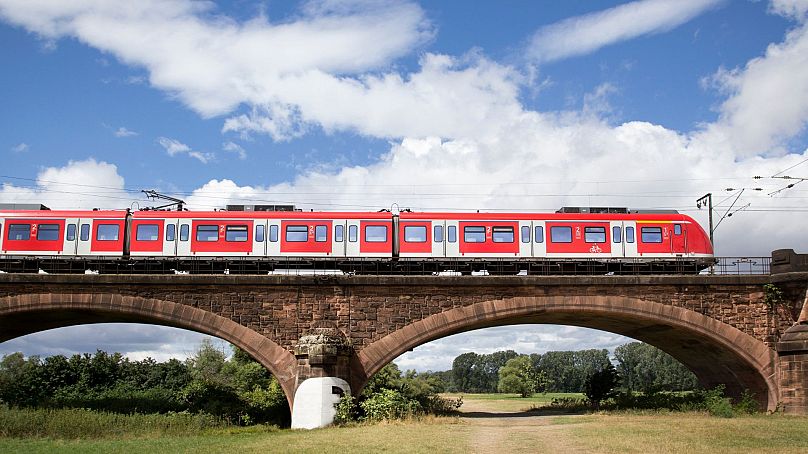Could a huge cash injection could bring the UK’s public transport in line with Europe?
Overhauling the UK’s public transport system could unlock £50 billion (€56 billion) and help the country meet its net zero goals.
 ADVERTISEMENT
ADVERTISEMENT
 ADVERTISEMENT
ADVERTISEMENT
These are the conclusions of a new report released by the Trade Union Congress (TUC), a union federation which has slammed the ‘gaping holes’ in the UK government’s public transport strategy.
The federation has urged the government to invest £18bn (€20.4bn) more a year in trains, trams, and buses by 2030.
This cash injection could cut car use by 20 per cent, suggested TUC General Secretary Paul Nowak.
“Everyone knows that we have to cut carbon emissions – and that switching to public transport is a big part of how to do it,” he said.
Plenty of European countries have already poured money into public transport schemes. What can the UK learn from its neighbours?
How much money is the UK government investing in public transport?
The UK Government has pledged some money to public transport.
It has promised £2bn (€2.3bn) to walking and cycling initiatives, and £3bn (€3.4) for decarbonising and expanding public transport networks. These initiatives are part of its COVID recovery plans and Ten Point Plan for a Green Industrial Revolution.
But the TUC think this is insufficient. The fund pales in comparison to other European economies.
The union federation wants the government to invest £10bn (€11.3bn) per year in infrastructure plus around £8bn (€9bn) per year in operational costs.
This money - earmarked until the mid 2030s - could electrify the entire rail network and guarantee an hourly bus service for every village.
It would also build HS2 - a massive high-speed railway linking up the north and south of England. The project has been beset by delays and soaring costs for years.
This would deliver an estimated £52bn (€59bn) annual boost to GDP by 2030 due to productivity gains, they claim. This is because one-fifth of UK households have no access to a car.
How does the UK’s public transport investment compare to European countries?
The UK lags behind many of its European neighbours when it comes to investment in public transport.
In Luxembourg, public transport has been free since 2020, funded by taxes. The government brought in the initiative to stem sky-high levels of car ownership - the country has 696 cars per 1,000 people, well above the EU average of 560.
The scheme - which costs about €41 million per year - is beloved by residents like teacher Ben Dratwicki.
"Transport is a fundamental right for residents. If you have the right to work, you also have the right to get to work without too many costs,” he said.
As the cost of living crisis bites, many countries have heavily subsidised public transport.
Last summer, Germany introduced a €9-per-month ticket that gave travellers unlimited use of local and regional services. Last week, Germany’s government voted to invest €45 billion into Deutsche Bahn - the national rail provider - by 2027.
Spain invested more than €700 million on a free-ticket scheme last year, offering travellers free long and short haul tickets. The scheme was recently extended until December this year.
How would the climate benefit from this mass investment?
Getting people out of cars and onto buses and trains is great for the planet.
According to a study by the Association of German Transport Companies, Germany’s €9 train scheme prevented 1.8 million tons of carbon pollution over last summer alone.
In the UK, the government has ambitious net zero goals, aiming to cut emissions by 68 per cent by 2030.
But according to the Climate Change Committee’s (CCC) most recent annual progress report to Parliament, current initiatives to decarbonise transport will only bring about half of the necessary emissions reductions.
To meet its goals, the UK must pursue a ‘modal shift’ away from cars, the TUC report warns.
This would require 120 per cent more journeys to be taken bus and tram, and an 80 per cent increase in rail journeys.
“Investing in public transport will help us meet net zero targets and reduce the threat of catastrophic climate change. And it creates jobs throughout England and Wales, boosts the economy in every community and improves everyone’s quality of life,’ said Nowak.
Are local authorities doing anything to encourage investment in public transport?
The country’s government isn’t the only authority investing in public transport.
Individual cities are also looking to urge commuters back onto public transport.
Earlier this week, the i reported that the Mayor of London Sadiq Khan is considering reclassifying Fridays to ‘off-peak’ travel, a change that would lead to much cheaper fares.











